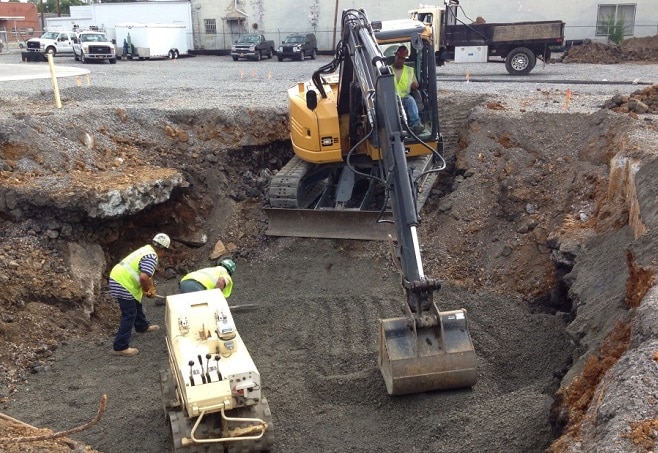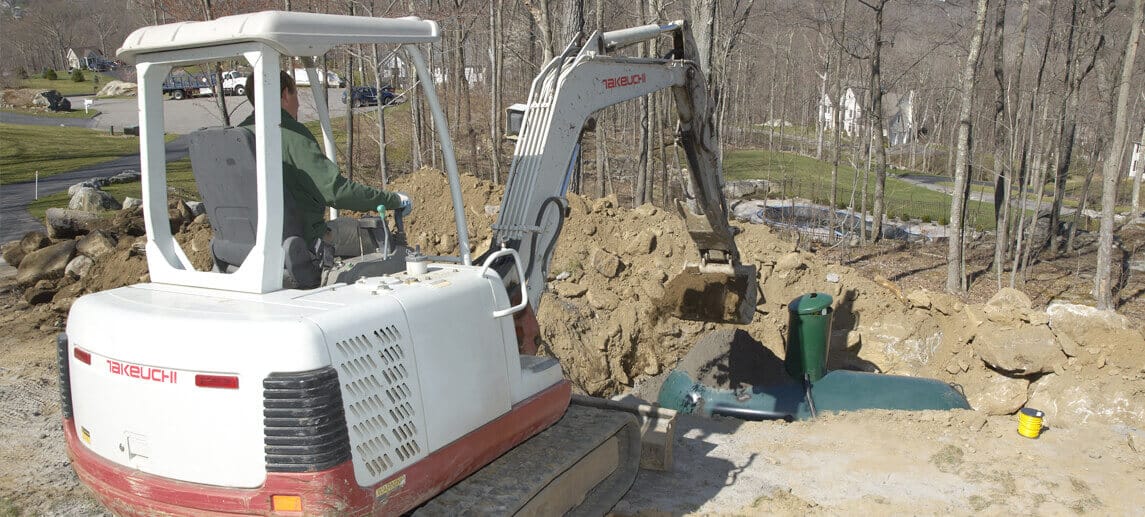Some Ideas on Mini Excavator You Should Know
Wiki Article
Indicators on Excavation Companies You Should Know
Table of ContentsEverything about ExcavatorThe Ultimate Guide To DemolitionAbout TrencherEverything about Mini ExcavatorThe smart Trick of Excavation Contractors Near Me That Nobody is Discussing


Scrapers or Pans dig deep into soil in one place, haul and also dispose the dirt in another place (excavator). It is hard to match the performance of scrapers for cut/fill soil procedure if the haul range is much less then a mile. Scrapes are typically pulled by a rubber tire wheel tractor and also are occasionally pressed through the cut area by an excavator.
There are often times that scrapes are not made use of for site grading and also a dump truck is used: the haul might be to long, the haul might go across roads where scrapers are not allowed, difficult rock might be run into, tools availability, and so on. Unload trucks remain in common usage as well as most likely require little conversation.
"Rock body" beds, on the other hand, have no tailgates as well as can dispose any type of size rock, although their volume ability is lessened. Compaction Devices enhances the density of the soil and also in some cases offers a smooth, rolled surface.
Our Excavation Companies PDFs
From a simple examination pit to percussion drilling to core exploration the owner has increasingly a lot more costly alternatives that generate increasingly better data concerning the website underground. The Owner on a 100,000 SF building project might accredit twenty uninteresting places with split spoon soil examples taken up until rock is reached and after that core examples of rock.Recognizing the kind as well as quality of rock (from the core examples) as well as location of rock (from the dirts boring) is an actual advantage in jobsite planning. Alternatively, the Proprietor of a 100,000 SF building might make a decision to wage no geotechnical screening whatsoever. The choice about geotechnical screening is normally made by an Owner without input from the Building and construction Manager.
An expertise of the approximate place of the rock helps the Building Supervisor to prepare the series of steps adhering to rock excavation. If rock is in one corner of a big structure job, for example, the earth excavation can begin at the contrary end of the structure in order to start structure work soonest.
Starting the structure work early would be an excellent idea if the rock might be gotten rid of by ripping. However, if the rock is incredibly tough as well as calls for substantial blasting, it may be sensible to hold foundation work up until the blasting is completed. The Building and construction Supervisor ought to work with these kinds of decisions as well as make use of all the technical date offered.
How Concrete Contractors can Save You Time, Stress, and Money.
Unclassified excavation specifies that all rock or other unanticipated products (omitting unsafe materials) experienced in the sitework will certainly be the responsibility of the Contractor at no modification in agreement cost. An unclassified excavation is less complex from a book-keeping perspective and also places the obligation for geotechnical problems onto the Sitework Professional.It's incredible what a heavy rain can do to a building and construction project. Prior to the rain, the site may be dry, heavy devices successfully relocating earth, the other trades smoothly doing their job.
In the majority of locations of the globe, the Construction Supervisor need to bear in mind an easy truth: IT WILL CERTAINLY RAIN. Good planning can minimize the damage and disruption of a heavy rain to a jobsite. Typically the excavation and also grading is delegated the Sitework Specialist (as well as their Foremen is accountable to monitor as well as guide the heavy equipment as well as drivers).
The Building and construction Manager need to be constantly conscious of what rain will certainly do to the task website. It is not uncommon for the Sitework Supervisor to function their heavy equipment for optimal effectiveness as well as hope it doesn't rain. One of the most effective ways to plan for rainfall is to slope all qualities to drain and to smooth rolled the surface before a rain.
The Ultimate Guide To Concrete Contractors
The Construction Supervisor should be far-sighted adequate to guarantee that hefty rainfall does not quit working on the job longer than needed. Daily conversations with Sitework Foremen may be needed to accomplish this goal. At any time excavation is needed below the existing aquifer on a task, the procedure of dewatering internet need to be taken into consideration.In an absolutely natural dirt, the water travels so slowly through the clay or silt that dewatering is not usually necessary for the relatively brief time of excavation. Dewatering might be required for a single ground excavation or for an entire job website. The most usual dewatering approaches are trench drains pipes, deep wells as well as well points.

Ground water seepage can also be lowered by cutoff techniques such as sheet piling. The prices for dewatering can be astonishing, including equipment service, labor and electricity (or gas). High dewatering costs have actually paled the profit margins on far a lot of projects. The lots of variables listed here make the work of estimating dewatering costs extremely challenging, and also extremely inexact.
This choice should always be considered when examining the prospect of dewatering. Certainly the alternative is only sensible if gravity can run the water to lower ground. Trench drains can be reduced with a backhoe and loaded with a coarse, granular material (# 4 rock as an example), but care needs to independence excavating be worked out in choosing the water electrical outlet type as well as area.
4 Simple Techniques For Excavation Companies
A siphon, by meaning, uses climatic pressure to lug water from one elevation, up over a barrier, to a lower elevation. The pipes in a siphon system must be airtight as well as some ingenuity is frequently called for to completely load the siphon pipe. The siphon pipeline should be complete for the siphon to begin.A deep well contains a pump, hose pipe and also a vertical well casing. The pump useful reference intake is at the base of the well housing (usually some crushed rock is placed down there as a filter tool) (trencher). The water is inflated the hose pipe, out of the well case, and to an ideal discharge location.
In a rugged sand, for instance, a big location can be pumped to near the pump consumption altitude. A less permeable dirt, on the various other hand, reduces the efficiency of a deep well. Since the pump is normally at the end of the deep well, there are no elevation limitations because of vacuum lift, and also deep wells can decrease the groundwater over 50 feet.
On the bottom of the wellpoint there is a 2 foot long screen as well as valve, water jets out of this shutoff as well as produces an opening into which the wellpoint pipe can be reduced. This opening is frequently made a larger diameter (for example 10 inches) to permit a crude sand backfill to help filter the water (concrete contractors).
Report this wiki page